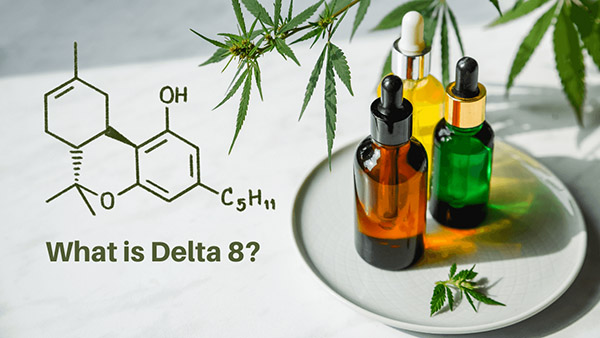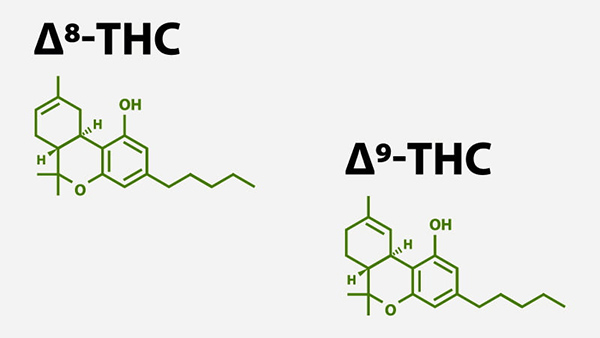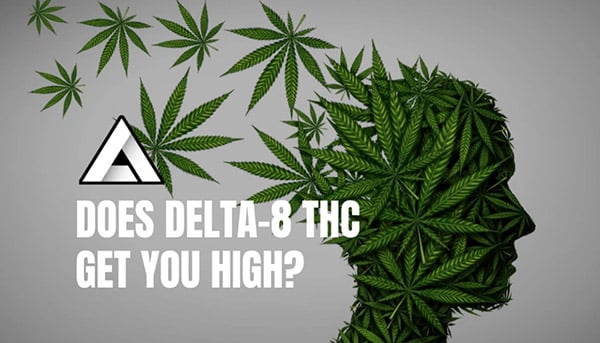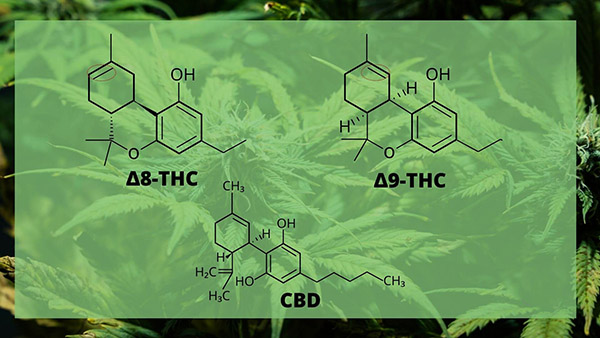What is delta-8 THC?
What is delta-8 THC?

While Delta-9 was discovered in the 60s, its cousin, Delta-8, is a relatively newly discovered cannabis compound. Delta-8 has seen a huge amount of popularity because of its similarity to Delta-9 THC (the main compound in cannabis), which creates a euphoric high. THC is found in large amounts in most strains of cannabis.
The similarities between the two cannabinoids lay in their chemical structures and names. THC is used to refer to Delta-9-tetrahydrocannabinol or Delta-9 THC, or in many cases, just Delta-9.
Delta-8-tetrahydrocannabinol is likewise shortened with tetrahydrocannabinol abbreviated to THC or just dropped altogether.
Delta-8 THC can produce similar effects to regular Delta-9 THC, but they are not as potent.
So Delta-8 and Delta-9 are different forms of THC.
Usually, when people say THC, they mean Delta-9 THC. (trough this article, when we use the term "THC" without modifiers, we refer to delta-9 THC.)
At present, the legality of Delta-8 is unclear. Due to the 2018 farm Bill, hemp can be legally grown and used for extractions across the United States, sometimes making delta-8 legal in states where delta-9 THC is illegal.
Nearly all Delta-8 THC you will see for sale is made from hemp-derived CBD, making it, at least in theory, part of the federal legal source chain. People in states where THC is illegal are hungry for cannabis products and are now looking for Delta-8 because it may be legal in their state, even if it's not as effective as regular THC. Many hemp-based extractors are ramping up the production of Delta-8 to meet this new demand and ship it across the United States.
What is the difference between Delta-8 and Delta-9 THC?

Both these THCs bind to the body's endocannabinoid system. Chemically, delta-8 and delta-9 are very similar in that they both have a double bond in their structure. This double bond is thought to be what creates the intoxicating effect that makes you feel high.
The two THCs are chemically different at the double bond position. Each of these two cannabinoids has a chain of carbon atoms, but delta-8 has a double bond on the eighth carbon, while delta-9 has a double bond on the ninth carbon.
Because of its double bond position, delta-8 binds to the endocannabinoid system in a slightly different way. It is thought this is what makes delta-8 much less effective than conventional THC. However, as with many developments in the cannabis space, more research is needed on delta-8 and its interactions with the body.
Does delta-8 make you high?

Delta-8 will get you high, though not as much as regular Delta-9 THC. Delta-8 may be a legal way to experience THC effects as you'd get from cannabis for those living where cannabis is illegal.
Some consumers may even prefer this less potent cannabinoid to regular THC, even if they can legally obtain THC products. THC can negatively affect some people, causing anxiety or paranoia. Delta-8 may provide milder highs.
The Delta-8 is used in e-cigarette cartridges so that you can use any 510 threat vape battery, such as the Lookah Snail. At the same time, Can also buy Delta-8 in a concentrate wax form, so you could use it in an Erig like the Unicorn or dab it with a dab pen or wax rig.
The effects of Delta-8
Delta-8 consumers reported many of the same results as THC users, such as a mild feeling of euphoria, well-being, a feeling of exhilaration, and relief from some symptoms such as pain, although the compound was much less potent. Delta-8 can also help treat insomnia.
Side effects can be similar to THC and include dry mouth, red eyes, munchies, short-term memory, paranoia, or anxiety.
Note that as delta-8 has not been extensively studied, more research is needed into its effects on the mind and body.
Delta - 8 and CBD

Delta-8 has more in common with Delta 9 than it does with CBD. Both chemically and because it delivers a high.
Delta-8 THC is more like Delta-9 THC that binds to the body's endocannabinoid system. Despite its medicinal value for consumers, CBD does not bind as easily to the endocannabinoid system and is therefore not intoxicating, although CBD does have other benefits.
If you seek effects similar to THC, but with reduced potency, delta-8 may be for you. If you are seeking relief from certain symptoms and don't want to feel intoxicated or need to remain alert, you may want to try CBD products.
How to dose delta-8
For most people, especially moderate or experienced cannabis consumers, delta-8 will feel much weaker than regular THC. If you're not familiar with marijuana, delta-8 can have a strong effect on you -- depending on your body chemistry.
To understand the potency of Delta-8 relative to THC, delta-8 edible manufacturers typically measure and dose their edibles at more than twice as strong as THC edibles:
· THC gummies may be labeled as 10 milligrams -- people might take half or a full one for doses of 5 milligrams or a full 10 milligrams.
· Delta-8 gummies would be labeled as 25 milligrams-- so half gummies would be 12.5 milligrams, and the whole one is 25 milligrams.
When making these standard gummies, manufacturers calculated that delta-8 is less than half as potent as regular THC, so 25 milligrams of Delta-8 might have the same effect as 10 milligrams of THC.
Again, it is important to note that delta-8 has rarely been studied. We know very little about how strong its effects are and how it affects the body. As with any cannabis product, the chemistry of cannabis, the chemistry of your body, your tolerance level, your set and settings, and the amount you take all affect how you feel.
It is always advisable to take a little first and wait for the effects to show before taking more. The consumption method affects how quickly you feel these effects. If you're using delta-8 in a vape, then you should start to feel the effects in ten minutes or maybe less. If taking as an edible, you should wait at least an hour or two before taking more, as it can take this long for the drugs to kick in.
Is delta-8 legal?
Delta-8 is currently in a legal grey area.
Only a few states have laws specifically addressing Delta-8 THC. Most state laws relating to cannabis or marijuana use language that covers marijuana, cannabis, THC, CBD, or delta-9 THC. To date, Delta-8 is considered illegal in 11 states under state law.
The Federal Drug Enforcement Administration (DEA) has indirectly classified Delta-8 THC as a Schedule I controlled substance in a proposed rule, which would make it federally illegal. The rule has not yet been finalized.
Delta-8 THC typically comes from hemp, not cannabis, which is why it's currently sold in many states where cannabis is illegal. More specifically, nearly all delta-8 THC currently on the market comes from CBD derived from federally legal marijuana.
This can be a bit confusing since cannabis is technically a cannabis plant that contains less than 0.3% THC. But when we talk about "marijuana," we usually mean marijuana plants with THC levels of 0.3 percent or higher.
Related to the
In the 2018 Farm Bill, Congress passed a federal bill to legalize hemp in the United States. The act defines hemp as "all derivatives, extracts, cannabinoids, isomers, acids, salts and salts of isomers, whether grown or not, having a concentration of delta-9 THC not exceeding 0.3 percent."
The wording of this bill makes delta-8 legal because it does not contain any delta-9 THC.
However, some states have not adopted this specific language of the farm bill in their own state laws, making delta-8 illegal in some states. Delta-8 producers and retailers sell only to states that have laws that reflect farm bill language. Even so, some manufacturers may only sell to certain states based on their own interpretation of a particular state's laws.
In addition, in August 2020, the DEA issued an Interim Final Rule (IFR), a document designed to update and confirm the differences between hemp and cannabis. The interim rule says "all synthetically derived THC remains a Schedule I controlled substance," which would make delta-8 illegal because it is extracted or synthetically derived THC.
So whether the language of the farm bill stands, banning plants that contain more than 0.3% delta-9 THC, or adopting the new IFR language, banning all THC, will determine the fate of Delta-8. The DEA's IFR will be open for review until October 2021, and until then, the federal legality of Delta-8 will remain unclear.
How is delta-8 made?
Trace amounts of delta-8 are found in hemp and cannabis plants, and because hemp is legally grown and more readily available anywhere in the United States, the cannabinoids often come from there.
Typically, CBD is extracted from cannabis and refined into isolates, which are then synthesized into delta-8. Therefore, delta-8 requires more processing and is more expensive to manufacture than CBD, but this increased production cost is offset by the high demand for it.
How do I find a good, safe Delta-8
Since delta-8 is relatively new to the market, it may be difficult to find a product that fits what they say and actually contains delta-8. When purchasing delta-8 products, check the manufacturer's website to see if they have information on how they source and manufacture the product.
Quality, tested products usually have a QR code or lot number on the box, allowing you to look up test results on the manufacturer's website. Stay away from products that are untested or have questionable test results because you don't even know if they contain delta-8, and they may contain harmful substances.
